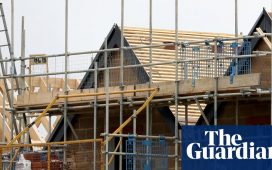Stay informed with free updates
Simply sign up to the UK property myFT Digest — delivered directly to your inbox.
The share of first-time buyers receiving a financial helping hand from the Bank of Mum and Dad is at an 11-year high, with more than half of buyers getting help from relatives, research has found.
Purchases where family members offered financial assistance accounted for 57 per cent of all first-time buyer transactions in 2023, the highest proportion since 2012. The share of buyers seeking help was up 10 percentage points on the previous year.
In spite of government measures to assist them, such as stamp duty breaks, many first-time buyers have struggled to buy as mortgage interest rates have soared in recent years and house prices have continued to creep up. Though these rates have started gradually to decline amid expectations of falling Bank of England base rates, they remain far higher than in the previous decade.
£9.4bnEstimated amount lent to first-time buyers by relatives in 2023
“More stringent mortgage requirements, which have been in place since the start of the pandemic, have impacted higher loan-to-value lending, most commonly used by first-time buyers,” said Frances McDonald, director of residential research at Savills, which carried out the analysis.
Citing Bank of England data, the estate agent said average quoted mortgage rates for 90 and 95 per cent LTV rates were 5.66 per cent and 6.08 per cent in July 2024.
It calculated that £9.4bn was loaned or gifted to first-time buyers from relatives last year — twice the total in 2019. Its forecasts for 2024-2026 predict a similar annual total (£9.3bn) will be handed over in each of the three years. Nearly £30bn is expected to go to family members over the period — in spite of expectations that mortgage rates will continue to decline.
“Despite the Bank of England’s recent decision to cut the base rate, we expect that lenders will continue to favour less risky, lower-LTV mortgage lending. This means that buyers will still have a hard time getting their first foot on the housing ladder,” said McDonald.
Another big hurdle for first-time buyers is the impact of soaring rents on their ability to save for a housing deposit. This week the Office for National Statistics found average UK private rents rose by 8.6 per cent in the 12 months to July — near the record annual rise of 9.2 per cent in March.
Those in London face the highest rises, with average rents rising by 9.7 per cent to £2,114 per month, compared with £1,700 in mid-2021. Research by estate agents suggests more landlords have sold than bought over recent years, with the reduced supply exacerbating the competition for rented homes.
As it sets out plans to boost Britain’s rate of housebuilding by reforming planning rules, the Labour party has pledged to improve the lot of first-time buyers by giving them first refusal over homes in new developments. It also plans to launch a “Freedom to Buy” scheme, guaranteeing a portion of a first-time buyer mortgage to encourage lenders to accept a lower deposit.










